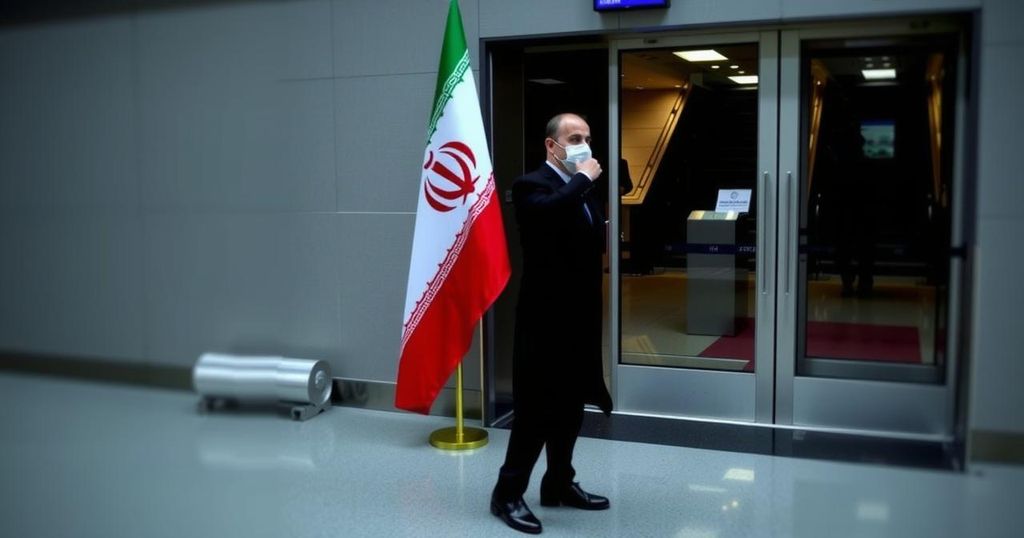Lebanon has confirmed that funds held by an Iranian diplomat at Beirut Airport were for embassy use, following a brief standoff over security inspections. This incident underscores ongoing tensions concerning Iranian influence in Lebanon and potential financial support for Hezbollah, amidst international scrutiny on Lebanese authorities regarding the monitoring of Iranian aid.
The recent incident at Beirut Airport involving an Iranian diplomat has prompted Lebanon’s Foreign Ministry to clarify that the funds in the diplomat’s possession were allocated for embassy operations. Following a refusal to allow security officials to inspect his luggage, the Lebanese government later confirmed that, under the Vienna Convention on Diplomatic Relations, the diplomat’s bags were authorized for entry. This incident has heightened tensions amid a backdrop of ongoing scrutiny regarding Iran’s support to Hezbollah and its presence in Lebanon.
It has come to light that two bags carried by the diplomat contained cash and documents for embassy use, as reported by Iranian media. A standoff occurred as security personnel attempted to inspect the luggage during the diplomat’s arrival, which drew a crowd of pro-Hezbollah individuals to the airport. This event marks a continuation of a tense atmosphere surrounding Iranian operations within Lebanon, especially regarding the flow of financial support to Hezbollah amid broader geopolitical implications.
Since November, this has been the third instance highlighting the delicate balance between diplomatic privileges and security measures in Lebanon. With the Lebanese authorities expressing intentions to regulate the inflow of Iranian resources to Hezbollah, it remains uncertain whether these actions will be substantively enforced or serve merely as a symbolic gesture to the international community.
Lebanon’s security officials have already indicated that any cash discovered on incoming flights will be subject to seizure. Reports further suggest that Iran has been attempting to funnel millions of dollars to Hezbollah through flights from Tehran. It was also previously noted by Hezbollah’s Deputy Secretary-General that substantial funds had been allocated to assist displaced Lebanese families, underlining the significance of Iranian financial assistance in enhancing Hezbollah’s capabilities and influence in the region.
The history of cash transfers to Iranian proxy groups has been well documented, raising concerns about regional security and the impact on Lebanon’s internal stability. This incident at Beirut Airport thus underscores the persistent challenges faced by Lebanese authorities in monitoring Iran’s activities and signals potential implications for Lebanon’s geopolitical positioning.
The incident involving the Iranian diplomat at Beirut Airport raises critical issues surrounding diplomatic immunity, the flow of funds from Iran to Hezbollah, and the implications for Lebanese sovereignty. Iran has been a long-time supporter of Hezbollah, a Lebanese Shiite militant group, providing it with financial and military backing. Amid rising tensions in the region, Lebanese authorities have been under scrutiny regarding their stance on limiting Iranian influence, particularly given Hezbollah’s role in internal and external conflicts, including its longstanding confrontation with Israel. Furthermore, the historical context of financial aid from Iran to various groups in Lebanon contributes to the complex dynamics of Lebanese politics and security.
The incident at Beirut Airport serves as a significant indicator of the ongoing complexities surrounding Iran’s diplomatic relations and their implications for Lebanon. With the confirmation of the funds intended for the embassy, it emphasizes the challenges Lebanese authorities face in regulating Iranian support to Hezbollah. As the Lebanese government navigates international pressures and internal dynamics, the future of Iranian funding and its impact on Hezbollah and local security remains an area of acute observation.
Original Source: www.iranintl.com






